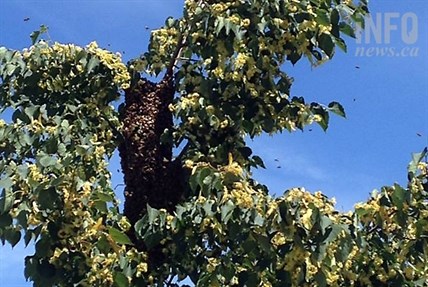
A prime swarm of bees caused havoc in a West Kelowna mall parking lot last Thursday.
Image Credit: Rick Bell
June 30, 2014 - 11:47 AM
WEST KELOWNA – It came over the horizon like a cloud of black smoke.
Fast moving and unified, the swarm of around 40,000 honey bees crossed the Snyastan mall parking lot and settled in a tree only metres from the main entrance of Bosley’s Pet Food.
Bosley’s manager Michelle Bell says she saw the swarm at around 9 a.m. Thursday morning and at first thought a fire had broken out nearby. When she heard the buzzing, she knew it was bees.
“It caused a lot of havoc in the area,” she says. “The bees were chasing people and cars and there were people running and screaming.”
Bell called the property manager immediately, who then contacted a local beekeeper to have the swarm relocated before they could build a hive.
Vic Macdonald of Bees Incorporated says Bell did the right thing by calling in an expert but says he wished more people knew the reasons for these swarms.
“Any bees that are flying around now are normally prime swarms,” he says. “They are the first swarms to leave the hive and they would number anywhere from 40 to 80 thousand. It would be about the size of a basketball.”
Macdonald says prime swarms would not attempt to build a hive in a tree and were likely just using it as a temporary stop over.
“If the weather is really bad they might leave a bit of a beeswax residue,” he says. “They will not make a nest out in the open, they prefer a secluded spot.”
Macdonald thinks the West Kelowna swarm was likely from one of three main beekeepers in the area.
“This is a normal reproductive cycle,” he says. “Beekeepers lose a lot of their bees this time of year.”
Prime swarms will set up in trees, on fence posts or under the overhang of a house or business and send out scouts to find a good spot for a new hive.
“Once those scouts come back with a suitable spot the whole cluster will move off the same day,” he says. “They would have left on their own.”
Macdonald says the problem with improperly removing the main cluster is that there can be as many as 4,000 scouts that will return to the spot.
“We don’t recommend moving bees unless you absolutely have to,” he says, adding it is very rare for prime swarms to sting because the bees' priority is setting up a new home, not protecting an existing one.
“They’re perfectly safe," he says. "Bees will gorge themselves on honey before they leave the old hive because they need that food to start the new colony. Once a bees gut is filled with honey they can’t extend the stinger and even if they could they don’t want to die and waste all that food.”
Macdonald says Bees Incorporated gets as many as three calls a day during the prime swarm season.
“It’s a very short season,” he says. “During wet weather the bees will hang and wait for warm weather, so when it gets hot out there will be twice as many. We encourage people to call us while bees are hanging out in the open and not wait for them to find a secluded spot.”
If you notice a prime swarm, you are asked to contact Vic through his website.
To contact the reporter for this story, email Adam Proskiw at aproskiw@infotelnews.ca or call 250-718-0428. To contact the editor, email mjones@infotelnews.ca or call 250-718-2724.
News from © iNFOnews, 2014